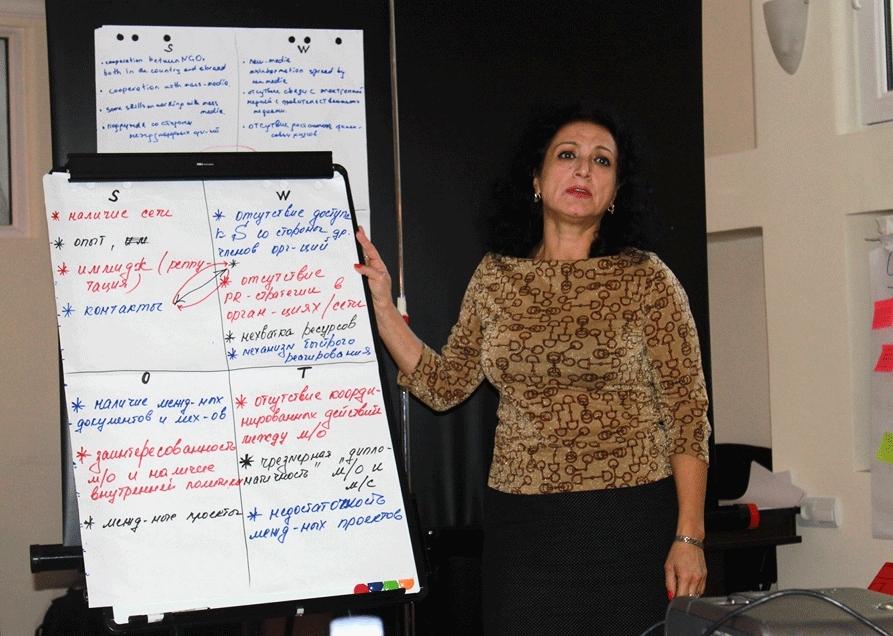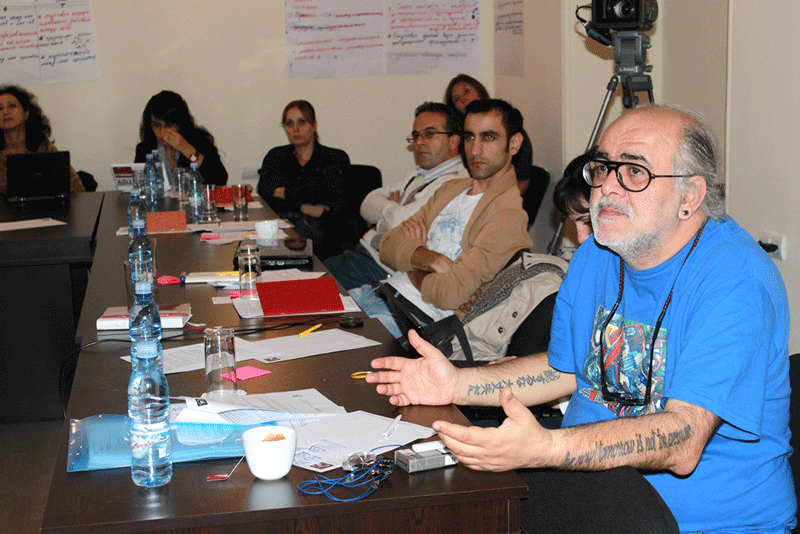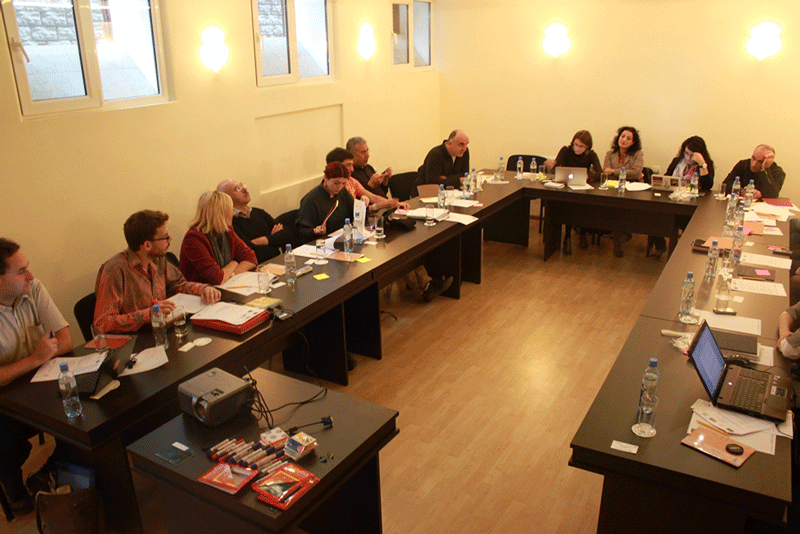During the meeting, human rights defenders raised main problems which they and lawyers encounter in South Caucasus countries – Georgia, Azerbaijan and Armenia.
“We have oil in Azerbaijan whilst Georgia and Armenia do not have it. It is the only difference between us. Otherwise, problems in all three countries are equal,” said human rights defender Intigam Aliyev from Azerbaijan and added that human rights defenders from all three countries need strong support from international partners, who will assist them in the resolution of their problems.
Faked elections, hard situation in penitentiary system, political prisoners, restriction of freedom of expression, persecution and detention of human rights defenders – it is short list of problems on which human rights organizations work in Georgia, Azerbaijan and Armenia. However, it is impossible to eradicate them without international support.
 “Short time ago, Azerbaijan parliament increased fines for unsanctioned assemblies 50 times. In parallel to it, government forbids assemblies in the city claiming they breach the public order. On that ground, majority of assemblies are not sanctioned. And we, human rights defenders, cannot even hold assemblies in Azerbaijan particularly after the parliament fixed strict fines,” said Dilara Efendieva from the Association for Protection of Women’s Rights at the conference and added that people, who are ready to protect human rights in Azerbaijan, automatically become ineligible people for the government and they are persecuted by various methods.
“Short time ago, Azerbaijan parliament increased fines for unsanctioned assemblies 50 times. In parallel to it, government forbids assemblies in the city claiming they breach the public order. On that ground, majority of assemblies are not sanctioned. And we, human rights defenders, cannot even hold assemblies in Azerbaijan particularly after the parliament fixed strict fines,” said Dilara Efendieva from the Association for Protection of Women’s Rights at the conference and added that people, who are ready to protect human rights in Azerbaijan, automatically become ineligible people for the government and they are persecuted by various methods.
South Caucasus Network of Human Rights Defenders has been trying to consolidate organizations acting in the SC countries around common problems. One of the main goals of the Tbilisi conference was to intensify this cooperation. At the same time, they prepared reports to international partners and worked out joint recommendations.
From Georgian side, the meeting was organized by Human Rights House Tbilisi. Its member organizations – Human Rights Center and Article 42 of the Constitution participated in the conference; they are also members of the SC Network of Human Rights Defenders. Protection of rights of human rights defenders and lawyers is one of the significant directions of the HRHT activities in Georgia. On May 11, the House organized a round table in the office of the Georgian Bar Association on: Institutional Persecution of Lawyers in Georgia. President of the Georgian Bar Association Zaza Khatiashvili also attended the meeting of the SC Network of Human Rights Defenders. His assistant Natia Chirikashvili actively participated in the planning of joint strategic campaign.
“Situation of human rights defenders in post-soviet countries of South Caucasus is too complicated. Their rights are often breached. Georgian lawyers work in hard conditions. We might be the only country where 141 lawyers are placed in prison,” said Natia Chirikashvili and added that planning of joint strategy will enable SC human rights defenders to more effectively work on the eradication of their problems.
Mikael Danielyan from Armenian Helsinki Association believes EU is passive in resolution the problems of human rights defenders in Armenia. He mentioned example of complicated  visa regime for Armenian human rights defenders in Europe. “After this meeting I am leaving for Brussels where I intend to introduce international partners with our recommendations. After long procedures, German embassy issued only three-day visa on me. Nevertheless, I have visited Schengen area countries 50 times; it is my fifth passport. Despite that German embassy requested me to bring passport of my sister too and finally they issued only three-day visa. I think, first of all, it is shame for the EU; they do not do anything to improve conditions for human rights defenders in Armenia.”
visa regime for Armenian human rights defenders in Europe. “After this meeting I am leaving for Brussels where I intend to introduce international partners with our recommendations. After long procedures, German embassy issued only three-day visa on me. Nevertheless, I have visited Schengen area countries 50 times; it is my fifth passport. Despite that German embassy requested me to bring passport of my sister too and finally they issued only three-day visa. I think, first of all, it is shame for the EU; they do not do anything to improve conditions for human rights defenders in Armenia.”
Ane Bonde, representative of the Human Rights House Network from Norway, will be one of those human rights defenders, who will lobby the rights of the South Caucasus human rights defenders in the EU. “We are going to collect information and recommendations at this conference and see what the joint recommendation from the region is; what is the main concern these three countries have in common. We will remind EU about the EU guidelines on the protection of human rights defenders to make sure that they follow up the recommendations they have made and that they instruct the embassies in different countries to have protection of human rights defenders as one of their priorities. Then we will translate the report into national languages and we will distribute it in the countries, within different international NGOs also in Brussels; so they will also have chance to raise these issues further and then they will do the lobbying.”
Human rights defenders, participating in the meeting, underlined several issues out of particularly problematic ones which will be focused when cooperating with international partners. They are: 1) smear campaign against human rights defenders and their stigmatization; 2) lack of independent judiciary system in SC countries where court is used as an instrument for the persecution of human rights defenders; 3) weak contacts with international organizations and institutions; 4) arrest of human rights defenders and their persecution under criminal, civil and administrative laws.
The meeting of South Caucasus Network was organized in Tbilisi by Azerbaijan organization Legal Education Society and Human Rights House Tbilisi with the partnership of Human Rights House Network, Human Rights Watch and Polish Helsinki Foundation.
Elene Chumburidze, Aleko Tskitishvili





